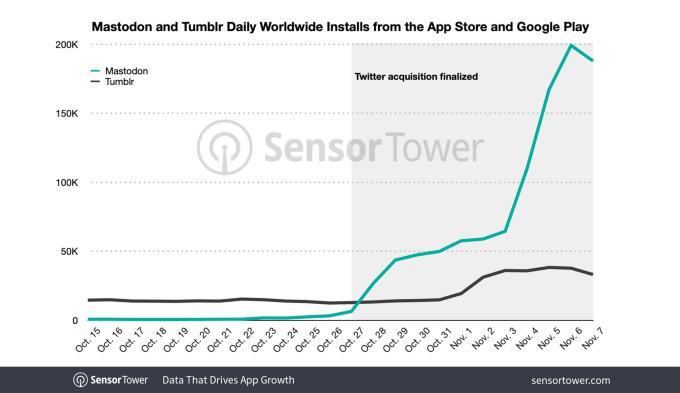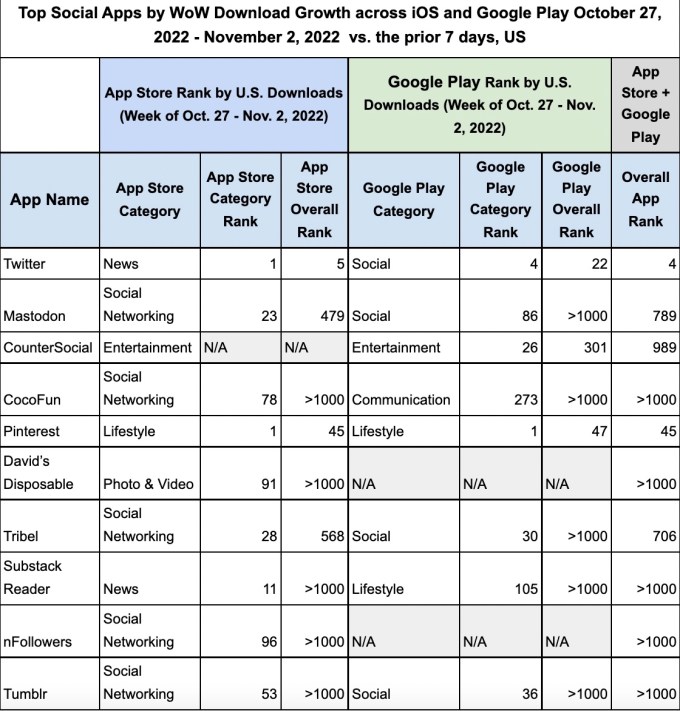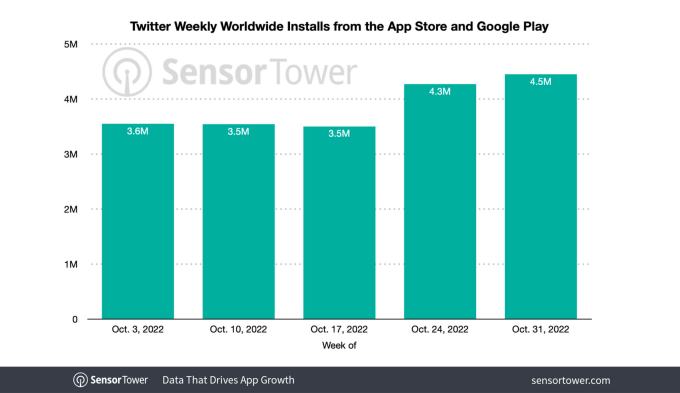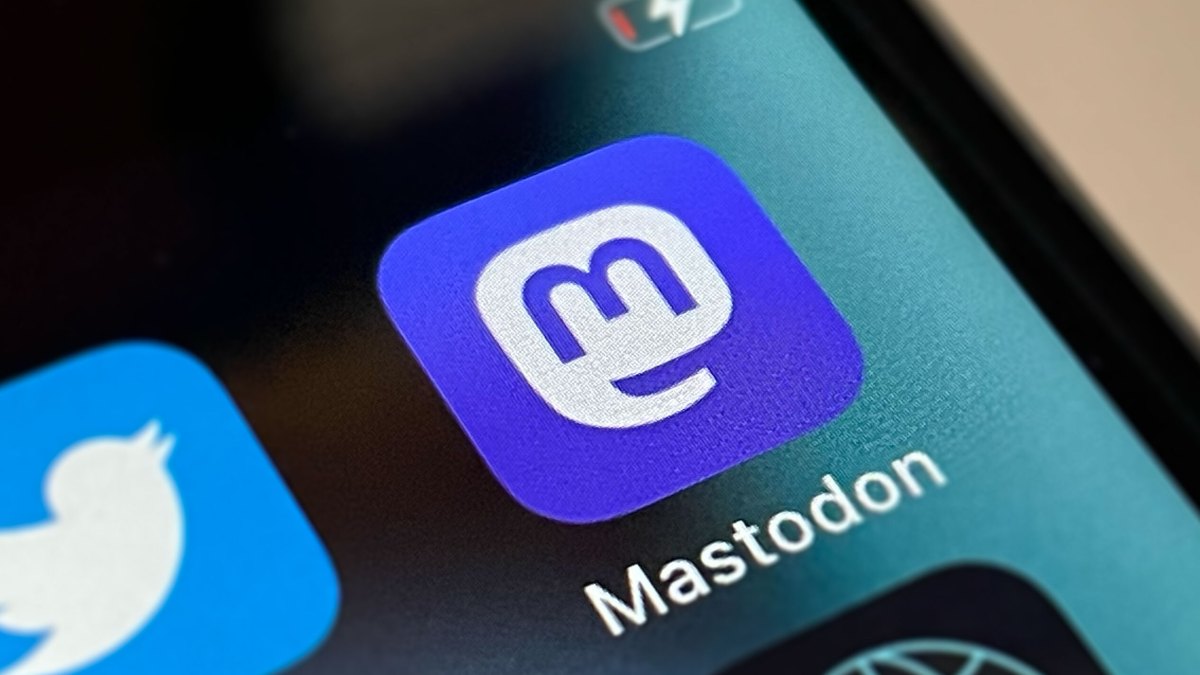Numerous social apps see gains in wake of Twitter chaos, new data shows
The drama at Twitter following Elon Musk’s acquisition has seen some users looking for an exit. In recent days, alternative social apps and microblogging platforms have seen strong gains, including, most notably, the open source decentralized Twitter alternative Mastodon. The service’s founder and CEO recently announced Mastodon had topped 1 million monthly active users, after more than half a million users joined the network since the October 27th Twitter deal’s closure. (It’s now reached 1.5 million.) But Mastodon isn’t the only app profiting from Twitter’s upheaval.
In a new report, app intelligence firm Sensor Tower analyzed social app growth after Musk took over.
It noted Mastodon has seen approximately 322,000 new downloads from U.S. app stores in the 12 days following Twitter’s acquisition (October 27 through November 7), which is more than 100x the 3,000 it had seen in the prior 12-day period. Globally, the app grew 657% to 1 million installs during that same October 27-November 7 time frame, up from 15,000 in the 12 days prior.
Other third-party Mastodon clients saw a bump, too, with Metatext and Tootle both growing from less than 1,000 installs to 19,000 and 7,000, respectively, between the two time periods.
But Mastodon isn’t the only network seeing an uptick in app installs, as it turns out.
Tumblr also saw its U.S. app installs grow 96% from 47,000 to 92,000 between the two time periods. Plus, its global installs grew 77% from 170,000 to 301,000.

Image Credits: Sensor Tower
In addition, alternative social app CounterSocial grew 2,300% to 24,000 installs in U.S. app stores in the 12 days following the acquisition, and grew 3,200% globally, with 33,000 installs, the report said.
Another app intelligence firm, data.ai, sliced the data in a slightly different way. It examined various social apps’ worldwide download growth during a seven-day period following the acquisition (October 27 through November 2), then compared that with the prior seven-day period.
Its data, shared exclusively with TechCrunch, also confirmed the sizable gains made by Mastodon and CounterSocial in terms of the growth in global installs between the two time periods. Mastodon’s installs jumped 2,200% and CounterSocial’s grew 1,200% its analysis found.
But Data.ai looked further up and down the apps stores’ charts and found that a number of other social apps were seeing bumps, beyond just direct Twitter alternatives.
These included David’s Disposable (up 83% during the two time periods), nFollowers (up 50%), CocoFun (up 46%), Substack Reader (up 24%), Tribel (up 11%), Tumblr (up 7%) and Pinterest (up 2%). Substack, in particular, has been marketing itself as a social community following the Twitter acquisition, even launching a new discussions feature that allows writers and their audience to engage in threaded chats. Dispo had fun trolling Twitter’s chaos in a couple of tweets and memes, like one that celebrated how Musk doesn’t own the Dispo app.

Image Credits: data.ai
This isn’t to say the drama has been all bad for Twitter. Surprisingly, some people have even newly installed the app since the acquisition, as it turns out.
Data.ai shows Twitter’s app installs jumped 17% after the acquisition, while Sensor Tower’s look at the slightly longer timeframe saw a 21% increase. The latter said Twitter saw 7.6 million global installs and $502,000 in consumer spending in the 12 days after the acquisition, an increase from 6.3 million installs and $303,000 in spending in the prior 12-day period.
These consumer spending numbers, however, should be taken with a grain of salt for now as Twitter Blue’s launch was put on pause after being live for only a couple of days. There’s no reason to believe that these figures indicate, as of yet, a significant increase in demand for the subscription with long-term staying power. That data will come in time. If anything, it shows Musk’s ability to market things to his fanbase and users’ general curiosity about what’s going on with Twitter’s products at present.

Image Credits: Sensor Tower
Though Twitter may have seen slight gains this week, not everyone is happy about the changes. Some angrier Twitter users took out their angst over the acquisition in the Twitter app’s reviews on the App Store.
On November 5, 2022, the app saw a spike in negative ratings as 119 one-star iOS reviews were added — the most it has seen in a single day during this latest surge in negative reviews, also according to data from Sensor Tower.
However, this isn’t the biggest surge of negative reviews Twitter has ever seen, we understand. Other incidents have caused larger bumps. After Trump was banned, for instance, Twitter saw 801 one-star reviews on January 9, 2021. It also saw a surge in March 2022 after the new timeline was rolled out and in April and when Elon Musk said he was buying Twitter.
Its largest spike in negative reviews this year wasn’t even this week — it was on October 28, when Musk’s deal was finalized.
Overall, however, it was the Israel-Palestine crisis in May 2021 that resulted in the highest volume of new negative reviews, followed by the Trump ban.
Got a news tip or inside information about a topic we covered? We’d love to hear from you. You can reach Sarah Perez at [email protected] or on Signal at 415.234.3994. Or you can drop us a note at [email protected]. If you prefer to remain anonymous click here to contact us, which includes SecureDrop (instructions here) and various encrypted messaging apps.




